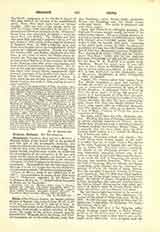

Chimalpain, DOMINGO (SAN ANTON Y MUNON), a Mexican Indian of the second half of the sixteenth and first half of the seventeenth centuries, who received a liberal education in the colleges for Indians of Mexico City under the direction of the clergy. His family having acquired some wealth, he undertook the investigation of the antiquities of his race, and wrote several works in Spanish and Nahuatl, one of which was published by Bustamante as the chronicle of Gemara, of which it appears to be either a copy or a paraphrase. He is credited with the following books, although it is not yet certain how far the attribution of authorship is correct: “Historia mexicana antigua”; “Cronica de Mexico desde el afio 1068 hasta el de 1597″; “Apuntamientos de sucesos desde 1064 hasta 1521”; “Relations originates de los Reines de Aculhuacan, Mexico, etc.”; “Relation de la Conquista de Mexico por los Espanoles”.
AD. F. BANDELIER

